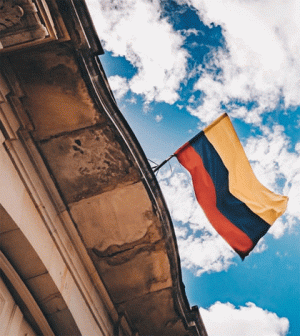- Finding Unshakable Power in a World That Wants to Pull Us ApartPosted 6 months ago
- What could a Donald Trump presidency mean for abortion rights?Posted 6 months ago
- Financial Empowerment: The Game-Changer for Women in Relationships and BeyondPosted 7 months ago
- Mental Health and Wellbeing Tips During and After PregnancyPosted 7 months ago
- Fall Renewal: Step outside your Comfort Zone & Experience Vibrant ChangePosted 7 months ago
- Women Entrepreneurs Need Support SystemsPosted 7 months ago
Colombia court poised to make historic abortion ruling

By Anastasia Moloney | @anastasiabogota | Reuters
Abortion is only allowed if a mother’s life is at risk, a fetus is malformed or the pregnancy is a result of rape
BOGOTA, Feb 24 (Thomson Reuters Foundation) – A top court in Colombia is set to rule on whether women can seek legal abortions during the first 16 weeks of pregnancy, a highly anticipated decision in a region with some of the world’s strictest reproductive rights laws.
Abortion in Colombia is only allowed if a mother’s life is at risk, if a fetus is malformed or if the pregnancy is a result of rape.
Most countries in Latin America and the Caribbean apply similar restrictions on abortion, while six countries in the region ban the procedure in all circumstances.
The judges on Colombia’s constitutional court are considering changes to the country’s law following a case brought before the court last year that proposed abortion be completely banned.
The case prompted the court to consider why abortion is restricted in Colombia and consider easing the law to allow elective abortion in the first 16 weeks of pregnancy.
If the court decriminalises abortion, Colombia would have one of the most lenient laws in South America. Only one other nation in the region – Uruguay – has allowed elective abortion up until 12 weeks since 2012.
Mexico City since 2007 and Mexico’s Oaxaca state following a ruling last year also have made it legal to terminate a pregnancy in the first 12 weeks.
A decision by the Colombian court is expected in early March.
The decision could come down to the two women on the court, according to Paula Avila-Guillen, director of Latin America Initiatives for the Women’s Equality Center, a health care and women’s rights advocacy organization.
Of the nine judges, four men are in favor, three are against, and the two women have the swing vote, she said.
“Colombia has already begun moving toward a more progressive society and if these two female judges choose to stand on the right side of history, this will be a historic moment for the court and the country,” she told the Thomson Reuters Foundation.
Pro-choice activists say a woman should make decisions about her own body and point to the dangers of illegal abortion.
Nearly 15% of maternal deaths worldwide are a result of botched illegal abortions, according to the World Health Organization.
OPPOSITION
The issue of abortion deeply divides people in Colombia and in the Catholic-majority region, where the influential Roman Catholic Church and evangelical groups say abortion is a sin and that laws must protect unborn children.
The case that prompted the court to look at the issue was brought by an anti-abortion campaigner, Natalia Bernal, who argued for a return to a total ban that was reversed by the court in 2006.
According to Bernal, abortion puts at risk the “life, dignity and health … of both a pregnant woman and her unborn son or daughter.”
Her argument led one of the male judges to urge the court to consider why abortion was restricted in the first place and to weigh easing the law.
In recent weeks, pro-life supporters and religious groups have staged small protests outside the constitutional court in Bogota and in other cities, holding placards that read: “Life is sacred” and “No one can take another person’s life away.”
Colombia’s conservative president, Ivan Duque, has said he believes life begins at conception.
Opinion polls suggest many Colombians agree with his view.
A Feb. 19 online poll by La Semana, a leading news magazine, found nearly 70% of 11,290 people who replied said they were against making abortion legal during the first four months of pregnancy.
Recent efforts to ease restrictions on abortion in other Latin American countries have failed.
In Argentina, despite a surging feminist and abortion movement, lawmakers rejected a bill to legalise abortion in 2018, while Ecuador voted down a law allowing abortion in cases of rape last year.
In El Salvador, where abortion has been totally banned since 1997 and dozens of women have been imprisoned for abortion-related crimes, several attempts to overturn the ban have failed.
(Reporting by Anastasia Moloney @anastasiabogota, Editing by Ellen Wulfhorst. Please credit the Thomson Reuters Foundation, the charitable arm of Thomson Reuters, that covers humanitarian news, women’s and LGBT+ rights, human trafficking, property rights, and climate change. Visit http://news.trust.org)
Our Standards: The Thomson Reuters Trust Principles.
Feature article image by: Flavia Carpio






